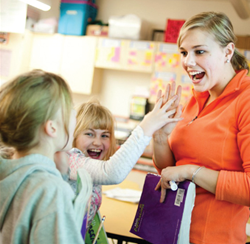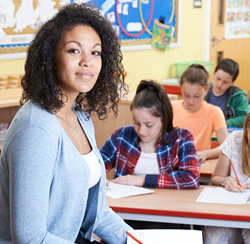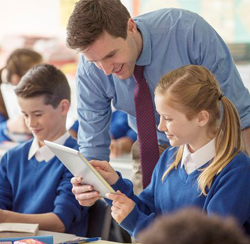PEITF Course Offerings
The PEI Teachers' Federation offers the following courses. The courses are recognized as a one-half credit (professional) by the Certification and Standards Board. To learn more about these courses, click on course below for detailed description.
MEANINGFUL ACTIVITIES TO GENERATE INTERESTING CLASSROOMSTM
This exciting, hands-on course offers you the opportunity to learn about and acquire a multitude of engaging activities that go beyond the textbook and worksheet. Participation in over 60 activities will give you practice in creating, evaluating, and adapting ideas to your own specific curriculum needs - immediately useful in your day-to-day teaching at any grade level.
1. Unlock your students' creativity as well as your own
- Learn how to tap your own creativity to make your classroom an engaging environment.
- Increase classroom creativity and instructional effectiveness by involving students in learning activities.
- Design activities that teach life skills using complex thinking patterns.
2. Learn to SCORE your activities and games
- Understand the criteria for organizing and preparing activities that motivate students to participate and make learning meaningful.
- Develop the critical overview necessary to ensure your activities develop important social skills, expand cognition, and fulfill curriculum requirements.
3. Discover when to use activities to promote learning
- Identify different types of activities and games and learn when and how they are best used.
- Experience the power of games and races in motivating students.
- Gain confidence in adapting activities to fit your scheduling needs - whether you have students all day or for one period.
- Master tools that create mystery, wonder, and surprise to effectively engage students - real classroom magic.
PURPOSEFUL LEARNING THROUGH MULTIPLE INTELLIGENCESTM
Based on the research of Howard Gardner, this is the traditional classroom course in MI, focusing on three major themes: understanding each of the eight intelligences, integrating the intelligences into classroom lesson plans, and discovering current schoolwide reforms that complement multiple intelligences. Some of those complementary reforms include: Integrated Thematic Instruction, projects, portfolios, work stations, and Live-Event Learning.
1. Understanding the Multiple Intelligences
- Identify your own dominant intelligences through various inventories.
- Use discovery centers to determine your various intelligence substrengths.
- Learn the multiple characteristics of each intelligence.
- Review Gardner's criteria for validating the intelligences.
2. Explore Each Intelligence to Expand Your Knowledge Base
- Identify how each intelligence manifests itself in the classroom.
- Participate in lesson vignettes for specific content areas.
- Develop teaching strategies for each intelligence.
- Build bridges to connect learning among intelligences.
3. Develop Lesson Plans that Incorporate the Intelligences Purposefully
- Participate in lessons presented at various grade levels.
- Work in groups to present an integrated multiple intelligences lesson.
- Review research articles that explore lesson application.
- Create personalized lesson plans to use in your classroom.
4. Create Schoolwide Integration Plans
- View schools that are using multiple intelligences in schoolwide programs.
- Review actual applications for schoolwide programs.
- Work in groups to develop implementation plans.
- Present implementation plans to classmates for suggestions and input.
ACHIEVING STUDENT OUTCOMES THROUGH COOPERATIVE LEARNINGTM
Achieving Student Outcomes Through Cooperative Learning trains educators to work with students in groups and shows them how to weave a student's mastery of subject matter with the development of lifelong interpersonal and questioning skills.
1. Create brief cooperative activities
- Choose cooperative processes that blend with class content.
- Determine optimum group configurations.
- Create positive interdependence.
- Develop questioning skills, using Questions for Life.
2. Create more extensive cooperative activities
- Choose interpersonal skills to be learned in tandem with subject matter.
- Determine optimum group size.
- Teach interpersonal and life questioning skills.
- Ascertain roles and materials to assign to each group.
- Develop techniques for observing groups as they work.
- Learn methods for debriefing subject matter and interpersonal skills.
3. Explore options for the teacher's role while groups work together
- Learn the difference between interaction and intervention.
- Ascertain when and how to approach groups having difficulties. Develop techniques to approach groups needing assistance.
- Learn techniques that assist students in solving their own problems.
- Use simple forms to design cooperative learning lessons.
4. Accumulate tips for producing quality group work
- Engage students who are "hitchhiking" on the work of others.
- Insure all students do their share of the work.
- Help student leaders share group responsibilities.
- Explore options for assessing group products as well as individual students.
DISCOVERING THE POWER OF LIVE-EVENT LEARNING®
Experience the value of using live events - real-life learning experiences - as a basis for integrating academic curriculum with important life skills. Discovering the Power of Live-Event Learning mirrors cognitive research about how the brain takes in and stores information, allowing you to:
Join the world of Live-Event Learning - an exciting and valuable
method of teaching limited only by your imagination
- Discover the power of teaching in a brain-compatible environment.
- Identify the important "Ready, Set, Go!" Process Skills inherent in every learning opportunity.
- Explore the "Ripples and Bubbles" implications of adapting Live-Event Learning to your school or workplace.
- Work in project teams to develop rich, meaningful Live-Event Learning Episodes.
- Click here to view ten Live-Event Learning ideas.
2. Understand the art of Facilitative Leadership
- Participate in role-plays to experience the attributes of a true facilitator.
- Identify leadership values that apply to teaching.
- Explore the difference between teaching and facilitating, and experience the freedom and flexibility of becoming a successful facilitative leader.
3. Become an expert on assessment!
- Learn how to design your assessment methods to match your method of teaching.
- Understand the value in all methods of assessing - from traditional to performance-based to self-assessment.
- Experience the power of ongoing assessment in a Live-Event Learning environment.
- Discover the habits of lifelong learning for yourself, your students, and your colleagues
BUILDING COMMUNICATION AND TEAMWORK IN THE CLASSROOM
(Project T.E.A.C.H.)
Course Description:
Reach a new level of positive communication with strategies necessary to foster an emotionally engaging classroom where students are connected to school, learning, and one another. Specific strategies are provided in the following areas: teacher leadership, communication and listening, positive thinking and support, and team building.
Learn the best methods for connecting with students
- Experience connecting strategies that motivate and engage students.
- Develop a plan for dealing with challenging students.
- Acquire techniques for building relationships with students.
- Gain a repertoire of connecting strategies to use in your classroom.
Master positive communication skills
- Learn powerful skills for reducing student resistances.
- Understand how to establish a positive teacher-student relationship.
- Improve verbal and nonverbal communication to build rapport.
Use team building to create a learning community
- Participate in hands-on team building activities.
- Understand how to tap student interests to gain cooperation.
- Learn the components of building a supportive classroom team.
Decrease disruptions by using nonconfrontational strategies
- Learn valuable techniques to maintain teacher momentum.
- Avert teacher-student confrontation.
- Develop strategies such as humour, detachment, and statements of feelings.
Create an emotionally safe learning environment
- Identify how Emotional Intelligence manifests itself in the classroom.
- Learn the extent of your influence over students.
- Understand the teacher leadership characteristics of relational classrooms.
- Teach your students interpersonal skills valuable for success in school and life.
TEACHING THROUGH LEARNING CHANNELSTM
Teaching Through Learning Channels trains educators to use brain-compatible strategies that reach students' natural learning channels.
1. Multisensory teaching
- Experience hands-on activities which use live events to awaken and stimulate the six senses.
- Participate in engaging lessons which teach to all the senses and sensory preferences.
- Practice and observe multisensory lessons.
- Learn to design engrossing lessons that rotate sensory elements.
2. Concept mastery
- Experience the five steps of a natural learning process through hands-on activities.
- Learn to replicate this natural process in lessons to optimize learning.
3. Perceptual and organizational styles
- Experience stimulating lessons taught in differing styles.
- Understand the differences between conceptual and organizational teaching and learning styles.
- Develop a repertoire of teaching strategies that speak to all students' learning styles.
4. Student motivation
- Understand five basic human needs affecting student motivation to learn and stay in school.
- Learn to use three techniques for motivating students.
- Observe the motivational skills of a master teacher.
- Understand how teaching in brain-compatible ways motivates students to remain in school by employing engaging teaching strategies that they enjoy.
5. Memory
- Experience intriguing multisensory memory aids.
- Develop your own useful memory techniques for use in the classroom.
IDEAS: BRAIN-BASED WAYS WE THINK AND LEARNTM
(formerly called: Patterns for IDEAS)
This lively course creates an understanding of the four critical thinking/problem-solving thought processes used on a regular basis in classroom and life — induction, deduction, analysis, and synthesis. Taught in an environment that models brain-compatible teaching and learning, educators explore how the brain takes in, stores, and communicates information. From this understanding, educators develop brain-based teaching strategies to take back to their classrooms. The latest in brain-compatible learning strategies are explored and incorporated into the educator's repertoire.
1. Gain an understanding of how the mind processes information
- Storage of information in patterns.
- Self-correction.
- Learning from experience.
- Capacity to create.
- Memory types and memories and emotions.
- Storage of concrete images.
- Generalizations from experiences.
- Synthesis building.
2. Learn to identify and practice types of critical thinking and
problem-solving
- Define each of four thinking processes as they exist in classroom applications.
- Model and practice each thinking process to insure transfer.
3. Create brain-compatible thinking and learning
- Practice developing brain-compatible lessons that move students from analysis to synthesis.
- Reflect on learning and thinking for the development of metacognition.
4. Learn to employ practical teaching techniques that model current
brain-research findings
- Creating a safe learning environment.
- Using techniques which improve memory.
- Developing meaningful content.
- Providing time to learn.
- Enriching the environment with visual and auditory elements.
- Employing Live-Event lessons.
- Using energizers to stimulate thinking and learning.
- Setting up strategic celebrations.
LITERACY FOR ALL
This course, consisting of thirty hours (ten three-hour sessions), will focus on the development of reading and writing rather than on literacy in its broadest definition. It is intended to help teachers who are already in the field grow in their understanding of reading and writing processes. The course will have a large practical component where teachers will have the opportunity to try out a variety of research-based instructional and assessment strategies in their own classrooms. An emphasis will be placed on meeting varying needs within the classroom. The course will also help teachers better articulate theory and practice to parents and the general public. The course will deal with such practical issues as: Understanding the Reading Process, Reading Assessment, Connecting Evaluation and Instruction, Reading Comprehension, Guided Reading, Understanding the Writing Process, Writing Assessment, and Instructional Strategies - Writing.







